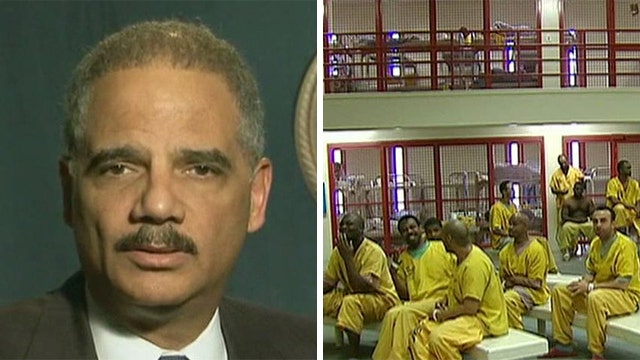Attorney General moves to shorten jail time for drug cases
Eric Holder moves to shorten sentences in federal drug cases
Federal prosecutors are at odds with U.S. Attorney General Eric Holder over whether mandatory minimum sentences -- a key part of the government's so-called war on drugs -- should be rolled back.
Congress approved many of those harsh penalties in the 1980s. Under the guidelines, a dealer busted with 1,000 marijuana plants, for example, or large amounts of certain narcotics, could face five, 10, even 20 years behind bars. As a result, prosecutors say, drug crime has gone down.
But now Holder is leading the charge to overhaul mandatory minimums.
Amid exploding incarceration rates, and allegations that long prison sentences have unfairly hurt low-income and minority communities, Holder is calling on Congress to pass the so-called Smarter Sentencing Act.
"Such legislation could ultimately save our country billions of dollars in prison costs while keeping us safe," Holder said. It would cut minimum sentences in half for many drug crimes, and give judges -- as opposed to prosecutors -- more leeway in sentencing offenders.
But many who've helped put serious drug dealers away disagree.
In a sharply worded letter to Holder, the National Association of Assistant U.S. Attorneys wrote "we consider the current federal mandatory minimum sentence framework as well-constructed and well worth preserving."
One federal prosecutor who spoke to Fox News on condition of anonymity said if the Smarter Sentencing Act passes, incarceration rates may go down, but drug crimes will go up because dealers won't feel compelled to cooperate.
"Now that we have crime under control, this bill would see drug crime surge all over again," the source said, calling the bill a "terrible idea."
Doug Burns, a former federal prosecutor and now a Fox News legal analyst, said the leverage of severe sentences has helped bring down kingpins, and crime rates.
"Mandatory minimums work very well, when you have a drug offender who can provide information against a big, big player, or an organization, or a cartel," Burns said. "You turn around and charge him with 20 years of mandatory time, and the defense attorney knows the only realistic way out of that is cooperation."
Prosecutors say if they get that cooperation, they will typically file lesser chargers that carry fewer years behind bars. In that way, they argue, the system is fair.
Paul Charlton, former Arizona U.S. Attorney, is among those who agree soaring prison costs warrant reforms, but tinkering with mandatory minimums could backfire.
"The reason we had mandatory minimums, and the reason we put them in place after the all-time high crime rates in the '80s, is because we wanted to reduce crime. We've done that. We need to be careful about how we change course now, and make sure we don't change course too quickly," he said.
The bill has passed out of the Senate Judiciary Committee, and heads next to the floor of the U.S. Senate.





